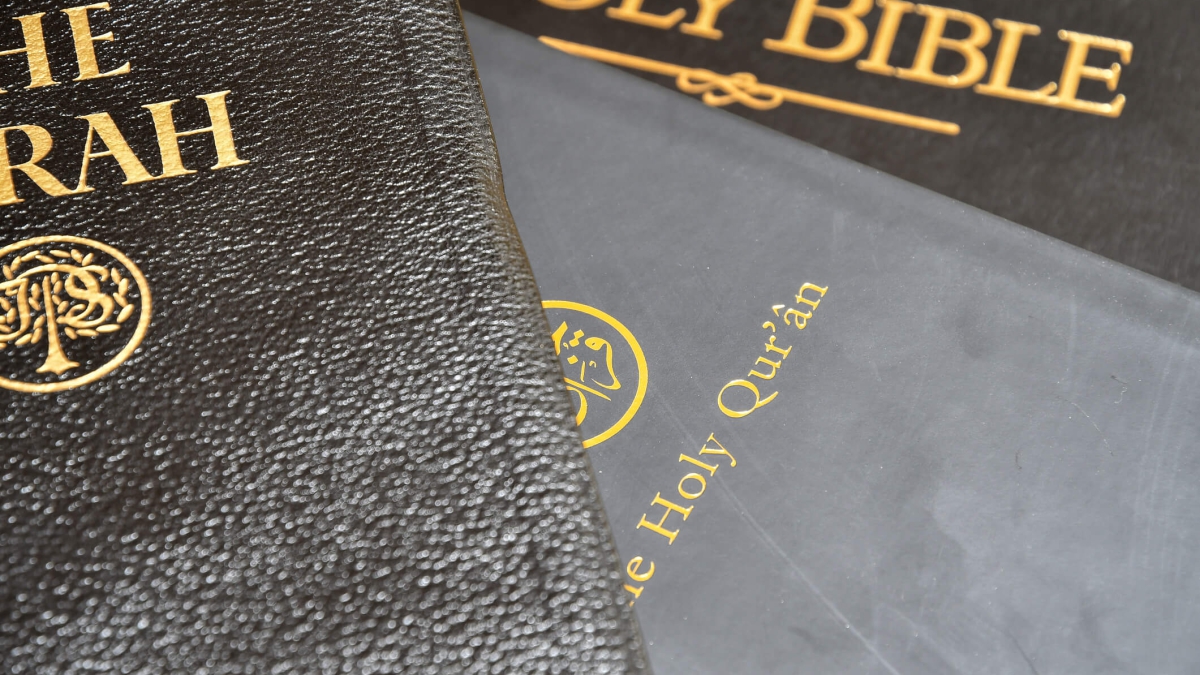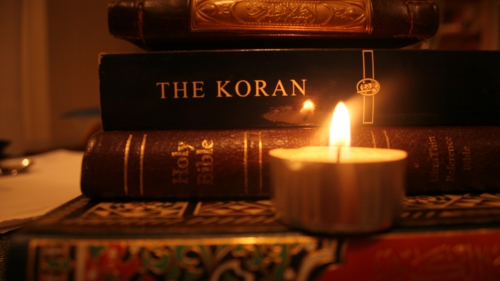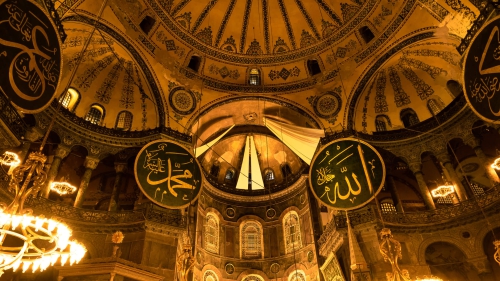Qur’an and Torah on the Origin of Judaism

In the Hebrew Bible, Prophet Abraham is the first person to be called a “Hebrew” (Genesis 14:13). The term Hebrew comes from the verb ‘to go over a boundary’— like the Euphrates or Jordan river— or ‘to be an immigrant.’ The first thing God told Prophet Abraham in the Biblical account was: “Leave your country, your kindred, and your father’s household, and go to the land I will show you. I will make you into a great nation, and I will bless you; I will make your name great, so that you will be a blessing.…” (Bible, Genesis 12:1-2)
So Prophet Abraham was what we can call the first ‘Islamic Hebrew’ or the first ‘Muslim Hebrew,’as the Qur’an indicates: “He (Abraham) was not Yahuudiyyaan, “a Jew”, nor Nasraaniyyaan, ‘a Christian,’ but rather a Haniifaan, ‘a Muslimaan,‘… (Quran, 3:67) i.e. ‘a monotheistic Hebrew believer submitting (islam) to the one imageless God’ who created all space and time and who made Prophet Abraham-the-Hebrew’s descendants through Prophets Isaac and Jacob (Israel) into a great multitude of monotheists called the Children of Israel —B’nai Israel in Hebrew and Banu Israel in Arabic.
In addition, Prophet Isaiah said: “Listen to me, you who pursue righteousness, you who seek the Lord: Look to the rock from which you were hewn, and to the quarry from which you were dug. Look to Abraham your father and to Sarah who bore you; for he [Abraham] was only one when I called him, that I might bless him and multiply him. (Bible, Isaiah 51:1-2)
And the Qur’an states: “You have an excellent example to follow in Abraham.” (Quran, 60:4) and “Follow the way of Abraham as people of pure (monotheistic) faith.” (Quran, 3:95)
What makes Prophet Abraham-the-Hebrew an excellent example of pure faith according to three different religion’s Sacred Scriptures? It is that all three scriptures proclaim Abraham to be the one “whom God chose to be His friend”: the Arabic Qur’an 4:125, the Hebrew Bible Isaiah 41:8; and the Greek New Testament Book of James [the brother of Jesus] 2:23.
Prophet Abraham-the-Hebrew, “whom God chose to be His friend,” —as far as we know— is also the only prophet to have two sons who were also prophets. And these two sons of Abraham, Prophet Ishmael and Prophet Isaac, are the only two Prophets who each had a descendant many many centuries later, who proclaimed a sacred scripture each of which has become the basis for one of the two largest religions in the whole world.
Abraham was the first of those we know to receive a Sacred Scripture (Quran 87:18-19). All of the others were among his descendants. Is being ‘the first’ what makes Abraham so special that his name appears 69 times in the Qur’an, second only to Moses (136 times)? No.
Abraham is famous for the numerous ways God tested him, especially the two terrible tests: banishing Hagar and his first born son Ishmael (Qur’an 2:124, & Genesis 16:1-16) and calling on Abraham to make his son a sacrificial offering to God. (Qur’an 37:100-113 & Genesis 22:1-24)
Most Muslim commentators say the son, unnamed in the Qur’an, was Ishmael (Arabic Isma’il). Some Muslims assert it was Isaac. Perhaps both participated in the test at different times, so that each son could produce descendants who in time would become a blessing for other nations of the earth. (Genesis 22:16-18 & Qur’an 4:163)
The great French medieval commentator Rashi notes that earlier rabbinic commentary states that one of the two young men who accompanied Abraham and Isaac was Ishmael. The Artscroll [Jewish] commentary states that Ishmael had come back to visit his father. Thus, both sons shared the test.
Prophet Isaiah said: But you, Israel, My servant —Jacob— whom I have chosen, are the offspring of Abraham, My friend…” (Bible, Isaiah 41:8)
So the biological offspring of Prophet Abraham-the-Hebrew (i.e., the Banu Israel) became the first ongoing monotheistic community when God rescued them from Egyptian oppression and made an enduring on-going covenant with them at Mount Sinai. Prophet Abraham-the-Hebrew was not born a Jew, but his descendants from his grandson Jacob/Israel became the Banu Israel—the Jewish People.
For 1200+ years after Prophet Moses, the Banu Israel was the only continuing on-going monotheistic community in the world. Unlike the other monotheistic communities that rose and fell during those centuries, most, but not all, of Banu Israel remained loyal to the covenant which God had made with them at Mount Sinai (i.e., Mount Tur – Quran 28:43-46).
It was only several centuries after Prophet Abraham-the-Hebrew that the Hebrew nation acquired its better-known name, the Children (Descendants) of Israel (in Hebrew B’nai Israel; in Arabic Banu Israel). The name of Abraham-the-Hebrew’s grandson, Prophet Jacob, was changed by God to Israel when his descendants were being oppressed in Egypt.
The Biblical book of Exodus, Chapter 1, introduces how Abraham’s Hebrew descendants became the Children of Israel: “Then a new king, to whom Joseph meant nothing, came to power in Egypt. ‘Look,’ he said to his people (the Egyptian nobility), ‘the Israelites have become far too numerous for us. Come, we must deal shrewdly with them or they will become even more numerous and, if war breaks out, will join our enemies, fight against us and leave the country.’
“So they put slave masters over them to oppress them with forced labor, and they built Pithom and Rameses as store cities for Pharaoh. But the more they were oppressed, the more they multiplied and spread; so the Egyptians came to dread the Israelites and worked them ruthlessly. They made their lives bitter with harsh labor in brick and mortar and with all kinds of work in the fields; in all their harsh labor the Egyptians worked them ruthlessly.
“The king of Egypt said to the Hebrew midwives, whose names were Shiphrah and Puah, ‘When you are helping the Hebrew women during childbirth on the delivery stool, if you see that the baby is a boy, kill him; but if it is a girl, let her live.’ The midwives, however, feared God and did not do what the king of Egypt had told them to do; they let the boys live.
"Then the king of Egypt summoned the midwives and asked them, ‘Why have you done this? Why have you let the boys live?’ The midwives answered Pharaoh, ‘Hebrew women are not like Egyptian women; they are vigorous and give birth before the midwives arrive.’ (Bible, Exodus 1:8-19)
In chapter 2 of Exodus when Pharaoh’s daughter sees baby Moses floating on the Nile in a basket, they both felt sorry for him. “This is one of the Hebrew babies,” she said. Then his sister (Miriam) asked Pharaoh’s daughter, “Shall I go and get one of the Hebrew women to nurse the baby for you?” (Bible, Exodus 2:6-7)
Over the next few chapters of Exodus, the usage of the religious-ethnic term ‘the Children of Israel’ becomes more and more frequent until —after the plagues against Pharoah— the community name, ‘Children of Israel’ becomes the norm. But the ethnic-national name ‘Hebrews’ was still in use centuries later, especially in contrast to non-Jews, as when Prophet Jonah identified himself to non-Jewish sailors as ‘a Hebrew.’ (Bible, Jonah 1:9).
A more religious Torah name for the Children of Israel is the term ‘Congregations’ or ‘Community’ of Israel, which is similar to the Arabic word ‘Ummah’ used to describe the Muslim religious community. This term was frequently used by the Rabbis and Sages in post Biblical times.
So where did the name ‘Jew’ come from? The Hebrew version is יְהוּדִי (Yehudi) for a male and יְהוּדִיָּה (Yehudeyah) for a female. But if you’d read the Hebrew Bible – in Hebrew or in English, you will see the words יהודי (Yehudi) and יהודייה (Yehudi‘yah) are strikingly absent because יהודי and יהודייה come from the name יְהוּדָה (Yehuda) – the name of one of the sons of Jacob; it is also the name of the part of the Land of Israel named after that son. In English, that piece of land is called Judea.
The term Yehudi (יְהוּדִי) occurs 74 times in the Masoretic text of the Hebrew Bible. The plural, Yehudim (הַיְּהוּדִים) first appears in 2 Kings 16:6 where it refers to a defeat for the Yehudi army or nation, and in 2 Chronicles 32:18, where it refers to the language of the Yehudim, namely Yehudit (יְהוּדִית).
The Biblical book of Jeremiah (34:9) has the earliest singular usage of the word Yehudi. In the book of Esther 2:5–6, the name Yehudi (יְהוּדִי) has a generic aspect, in this case referring to a man from the tribe of Benjamin:
“A Jewish man (a man from Judea) was in Shushan the capital [of Persia], and his name was Mordecai, who was exiled from Jerusalem… ”(Bible, Book of Esther 2:5-6)
It is hard for many Muslims to understand the intertwined nature of the religion of Judaism with the ongoing nature of the ethnic Jewish People because, although Judaism and Islam are very close in most ways, they differ greatly from each other in their origins: Abraham was an ethnic Hebrew, and a monotheist, but not himself a ‘Jew,’ as the Quran correctly notes; yet Abraham’s descendants through his son Isaac (Arabic Isḥaq) and grandson Jacob /Israel (Arabic Ya’kob/Isra’el) were later to become ethnic Hebrews/religious ‘Jews’: Yehudim—Banu Isra’el.
However, Abraham’s descendants through his son Ishma’el (Arabic Isma’il) would be ethnic Arabs —a separate Semitic people— and later religiously Christians and Muslims. All three groups were in the monotheist tradition, stemming from the pure monotheist, the ‘Friend of God,’ Abraham-the-Hebrew, whom I prefer to call the first ‘Islamic’ Hebrew or the first ‘Muslim’ Hebrew, that is, the first Hebrew monotheist submitted [Arabic ‘islama’: to submit] to the one God.
Muslims needed only one Prophet and one book. Jews needed dozens of Prophets and many Sacred Scriptures.
While Christians, Jews and Muslims should make no disrespectful distinction between any of their prophets or their sacred scriptures, we cannot help but notice that the circumstances and style of the Hebrew Bible and the Qur’an as written revelations are very distinct:
The Hebrew Sacred Scriptures are a vast collection (305,358 Hebrew words) of Divinely inspired books written over a period of almost a thousand years, by 48 male prophets and 7 female prophetesses (Talmud Megillah14a); plus many more anonymous Divinely-inspired historians, poets, and philosophers.
The Arabic Qur’an is much shorter (a total of 77,934 Arabic words) recited by only one prophet during a period of less than two dozen years and written down by his own disciples.
Most people in the world have learned of Prophet Abraham, not by reading a book of Jewish history or religion, but by listening to and reading from the Christian Bible or the Muslim Qur’an. This unique and amazing situation is a reflection of a promise made to Prophet Abraham-the-Hebrew more than 36 centuries ago, and recorded in both the Torah and the Qur’an:
“I swear (says God) because you did this —not withholding your son, your favorite one— I will bestow My blessing on you and make your descendants as numerous as the stars in the sky and the sand on the seashore; and your descendants shall seize the gates of their foes. All the nations of the earth shall bless themselves by your descendants, because you have obeyed My command.” (Bible, Genesis 22:16-18)
and
“Indeed, We chose him (Abraham) as one pure and most distinguished in the world, and he is surely among the righteous in the Hereafter.” (Qur’an 2:130)
Topics: Interfaith, Judaism, Prophet Ibrahim (Abraham), Quran, Torah
Views:10988
Related Suggestions

















